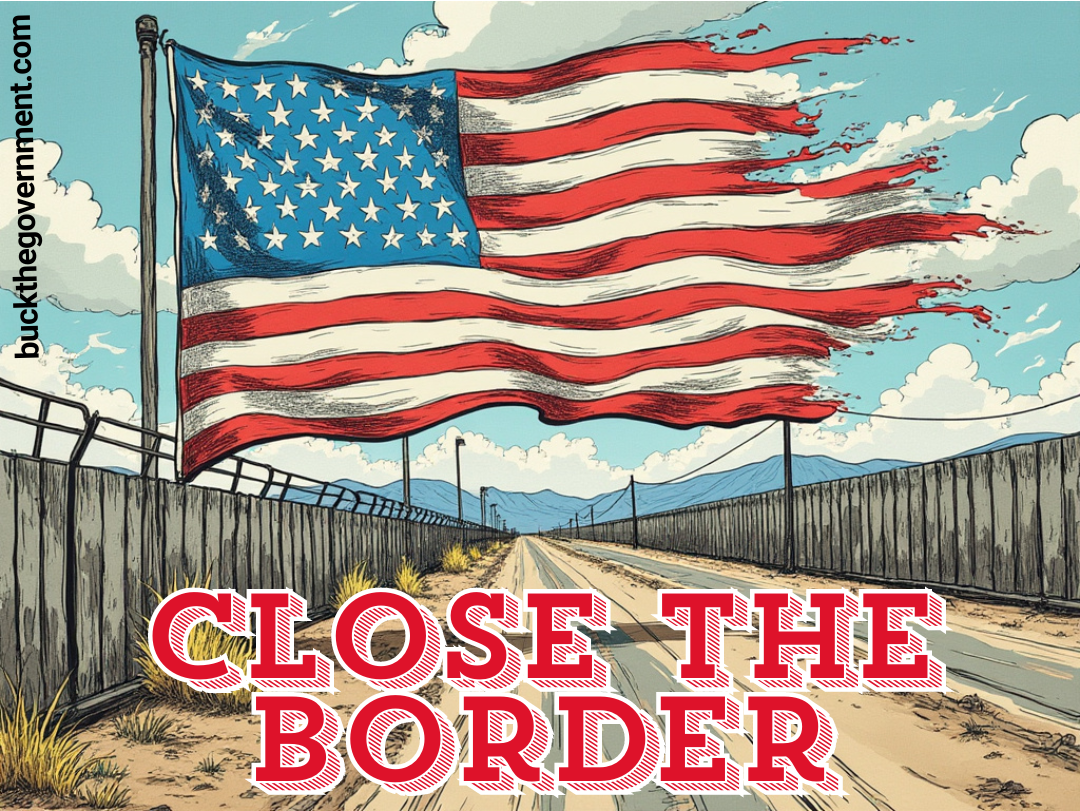The topic of open borders in the U.S. has reached a boiling point across the country, especially in those communities that have seen an influx of criminal invaders over the past 3.5 years. Stricter immigration controls are an absolute must if we want to continue being a sovereign nation. Here’s a detailed look at the top crisis that have been purposely created by the Biden/Harris regime's open border policies:
1. National Security Risks:
- Terrorism and Criminal Activity: One of the most common concerns about open borders is the potential for terrorists, gang members, or other criminals to enter the country unchecked. Without rigorous vetting processes at the borders, it becomes harder to prevent individuals with criminal backgrounds or ties to terrorist organizations from crossing into the U.S. Uncontrolled border crossings could increase the likelihood of foreign terrorist cells operating within the country.
- Drug and Human Trafficking: Open borders could facilitate the movement of drugs and human trafficking networks. The U.S. already struggles with drug trafficking, particularly from cartels in Latin America, and human trafficking is a major issue, with vulnerable people often being smuggled across borders. Without stronger border controls, it may be difficult to combat these illegal operations effectively.
- Weakening of Immigration Enforcement: Open borders could lead to the erosion of immigration laws, making it difficult for law enforcement agencies like U.S. Immigration and Customs Enforcement (ICE) to track or detain individuals involved in illegal activities. This could allow criminal organizations to operate with less fear of being apprehended.
- The corrupt Democrat party is already breaking laws all over the country to allow these criminal invaders to vote in the November Presidential Election and this will have devastating repercussions and spell the end of the USA if they are able to steal the election again.
2. Economic Strain:
Strain on Public Services: Open borders could potentially strain public services like healthcare, education, and welfare systems. If large numbers of criminal invaders enter the country, they may require services that they have not contributed to through taxes, which could put a financial burden on state and federal resources. Public hospitals, schools, and welfare systems might face overwhelming demand, making it difficult to maintain quality services for everyone.
Tax Revenue and Economic Contributions: While immigrants can contribute to the economy through labor, many worry that without a legal status, individuals working in the informal economy may not pay taxes or contribute adequately to public systems, exacerbating fiscal strain on already stretched resources.
3. Social and Cultural Challenges:
Assimilation and Cultural Integration: Some argue that open borders could lead to difficulties in integrating large numbers of new immigrants into the social fabric of the U.S. With a rapid influx of people from different cultural backgrounds, it could become challenging to maintain a sense of national identity and unity. Critics of open borders fear that such a policy would lead to fragmented communities, where cultural differences might create tensions or divisions rather than fostering inclusion and understanding.
Language Barriers and Education: The U.S. education system could face challenges if a large number of students arrive with limited English proficiency. This might require schools to divert resources to language instruction and special education programs, potentially reducing the quality of education for all students.
Public Safety and Policing: If large numbers of individuals enter the U.S. illegally and cannot be tracked or documented, law enforcement may struggle to maintain public safety. Additionally, some fear that open borders could foster the growth of black markets and underground economies that contribute to an increase in crime rates.
4. Healthcare Concerns:
Pressure on Healthcare Systems: Open borders could lead to increased demand for healthcare services, particularly in border states that already face high volumes of immigrant populations. Public hospitals could become overwhelmed, leading to longer wait times and a reduction in the quality of care. Criminal invaders may also avoid seeking necessary medical care due to fears of deportation, which could lead to the spread of untreated illnesses or communicable diseases.
Pandemics and Public Health: The COVID-19 pandemic has highlighted the importance of controlling movement across borders to prevent the spread of disease. Critics of open borders argue that without checks at the border, the U.S. could become more vulnerable to the spread of infectious diseases, as there would be less oversight and fewer mechanisms for screening individuals entering the country. So, why is the Biden/Harris regime allowing criminal invaders to pour into this country and not require any "vaccines" for them?
5. National Sovereignty and Law Enforcement:
- Erosion of National Sovereignty: Open borders could undermine the U.S. government's ability to control its own territory and regulate who enters the country. National borders are a key component of sovereignty, allowing a country to enforce its laws, protect its citizens, and regulate immigration. Without control over the border, the U.S. could lose its ability to enforce its laws effectively, weakening the government's ability to protect its citizens.
- Loss of Legal Frameworks: If the U.S. were to adopt an open-border policy, the existing legal frameworks governing immigration, asylum, and visas would become irrelevant. This could lead to a breakdown in the legal immigration system, as people would be able to bypass the established processes for entering the country legally.
6. Potential for Increased Illegal Immigration:
- Illegal Entry and Overstaying Visas: With open borders, the distinction between legal and illegal immigration could blur. Individuals might feel emboldened to cross into the U.S. without going through the formal process, potentially leading to an increase in people living in the country without legal status. This could make it more difficult for authorities to track and manage the population, leading to issues with law enforcement and national security.
- Amnesty and Encouraging Further Migration: Some argue that the perception of open borders or lax immigration enforcement could encourage even more people to migrate illegally, expecting to receive amnesty or legal status later. This could create a cycle of illegal immigration that is difficult to control, particularly if incentives like free healthcare or education are available to undocumented individuals.
7. Impact on Border States and Beyond:
Overburdened Local Governments: States along the U.S.-Mexico border, such as Texas, Arizona, and California, could face disproportionate challenges if open borders led to large numbers of immigrants crossing into the U.S. Local governments might struggle to provide resources, law enforcement, and social services to accommodate the influx, leading to fiscal and administrative strain. Also, look at cities like Springfield, OH, where Biden/Harris have flown 20,000 criminal invaders in the dark of night to destroy that part of our country.
Public Safety Concerns: Some border communities have voiced concerns about crime, drug trafficking, and human trafficking. Open borders could exacerbate these issues by allowing individuals to cross without oversight or regulation, potentially increasing the burden on local law enforcement agencies.
Conclusion:
The dangers associated with open borders are primarily centered around concerns of national security, economic strain, cultural integration, public health, and law enforcement challenges. Without proper border control, the U.S. would face significant risks, including an influx of criminal invaders, increased crime, overburdened public services, and a loss of national sovereignty. A country without laws and without borders is no longer a country.


